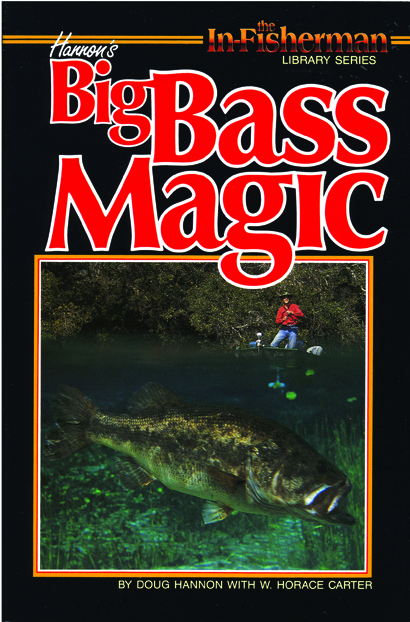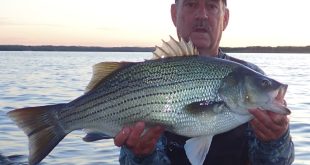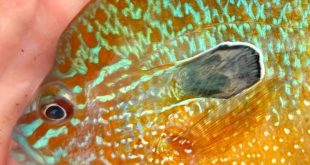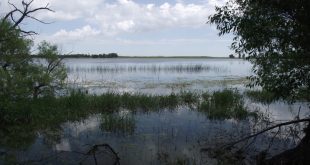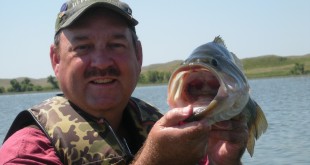This news is over a month old now, and I suspect many hard-core anglers may not even realize that we recently lost a legend, Doug Hannon. Here is the release that ran on the Bassmaster website, http://www.bassmaster.com/news/doug-hannon-dead-66 .
Doug Hannon dead at 66
“The Bass Professor” passed away at his Florida home
 Don WirthDoug Hannon was known to millions as “The Bass Professor.”
Don WirthDoug Hannon was known to millions as “The Bass Professor.”By Ken Duke
APR 1, 2013Doug Hannon, “The Bass Professor,” died at his home in Tarpon Springs, Fla., on Friday, March 29, following complications from neck surgery. He was 66 years old.
Hannon was born in Winnipeg, Canada, moved to the United States at the age of seven, and came to prominence in the bass fishing world as a Central Florida fishing guide in the 1970s and ’80s. He caught more than 800 bass weighing better than 10 pounds in his career, including a personal best of 17 pounds.
Along with W. Horace Carter, Tim Tucker and Don Wirth, Hannon wrote several books on bass fishing, including Hannon’s Field Guide for Bass Fishing (1980),Catch Bass! (1984), Hannon’s Big Bass Magic (1986), and Doug Hannon’s Fisherman’s Logbook (1992).
In the preface to his first book, Homer Circle wrote, “Doug Hannon is one of the nation’s better trophy bass fishermen because he has studied bass: habits, habitat, physiology, biology, patterns, individual behavior quirks, and has lived with this obsession virtually on a daily basis…. And one of the ‘keeper’ memories of my association with him is his concern and empathy for this wild creature he pursues.”
Hannon did not begin bass fishing until he was a psychology student at Tulane University in New Orleans. There he met his future wife, Lynn Peters of Texas. While visiting her family’s ranch, she took Hannon bass fishing, and he became fascinated with the sport.
Hannon was able to turn his passion into a career because his father, an oil geologist, established a trust for his children, enabling Doug and Lynn to move to Florida after graduation in 1970 and pursue his interest in bass fishing while his wife worked as a sculptor.
By interviewing the top anglers in the Sunshine State and working to refine their methods, Hannon developed his own theories for targeting big bass. He used both live and artificial baits in his fishing, and did most of his angling and research on small, natural lakes and rivers in Florida. He also kept a 7,000 gallon research tank in his backyard, where he observed bass throughout the year.
When he began to receive a lot of media attention for his catches in the 1970s and ’80s, Hannon’s ideas were often the subject of controversy and criticism among fisheries biologists and other experts, but few could deny his success or his ability to generate publicity. Apart from popular tournament anglers of the era, few others in the bass community received as much attention as Hannon. He appeared on the cover ofBassmaster Magazine twice in one year (1984) and is the only person ever to appear on the cover and also take a cover photo (March 1992). For several years, he was regularly featured on “The Bassmasters” television program in a segment titled “The Bass Professor.”
Along with his books and articles on bass fishing, Hannon was also a tackle inventor, holding nearly 20 patents on a variety of fishing and boating products, most recently, the WaveSpin spinning reel and MicroWave spinning rod guides. In the late 1990s, he was closely associated with the now defunct Big Bass Record Club, which placed a multi-million dollar bounty on the world record largemouth bass.
Hannon ended his last book, Hannon’s Big Bass Magic, with a chapter titled “A Lesson from Childhood,” in which he tells the story of seeing his first big bass while out walking the shores of an East Texas pond. He wrote about the significance of chasing childhood dreams and asked the question, “What’s it like to be alive?”
He answered in the last sentence: “Eureka, I have found it in bass fishing!”
Hannon’s wife Lynn died of cancer in 2006. They had no children. He is survived by a brother and sister.
You might be wondering why a pointy-headed fisheries biologist and hard-core angler in Nebraska is blogging about this? I will tell you why. I have read a lot of Doug Hannon’s “stuff” over the years and was fascinated by it. He was a keen observer and took a different approach to bass fishing. Doug believed that big bass, trophy bass, were different than the bulk of bass pursued and caught by most anglers, including most tournament anglers. Much of the thinking I have on catching big fish, big fish of a variety of species, comes from Doug Hannon’s writings that I have read over the years (If you want an example of my thinking on that subject: http://magazine.outdoornebraska.gov/2013/04/big-fish-5/ ). Earlier this year I blogged about the catching of some phenomenally big largemouth bass from public water in Nebraska, and I will guarantee you that the capture of those fish coincided with a lot of what Doug Hannon believed about big bass.
Doug may be gone, but some of his writings are still available. If you want to catch more big fish, big largemouth bass in particular, but any big fish in general, I would highly recommend you read anything written by Doug Hannon! Big Bass Magic is still available, https://store.intermediaoutdoors.com/index.php?brand=all .
 Nebraskaland Magazine
Nebraskaland Magazine
